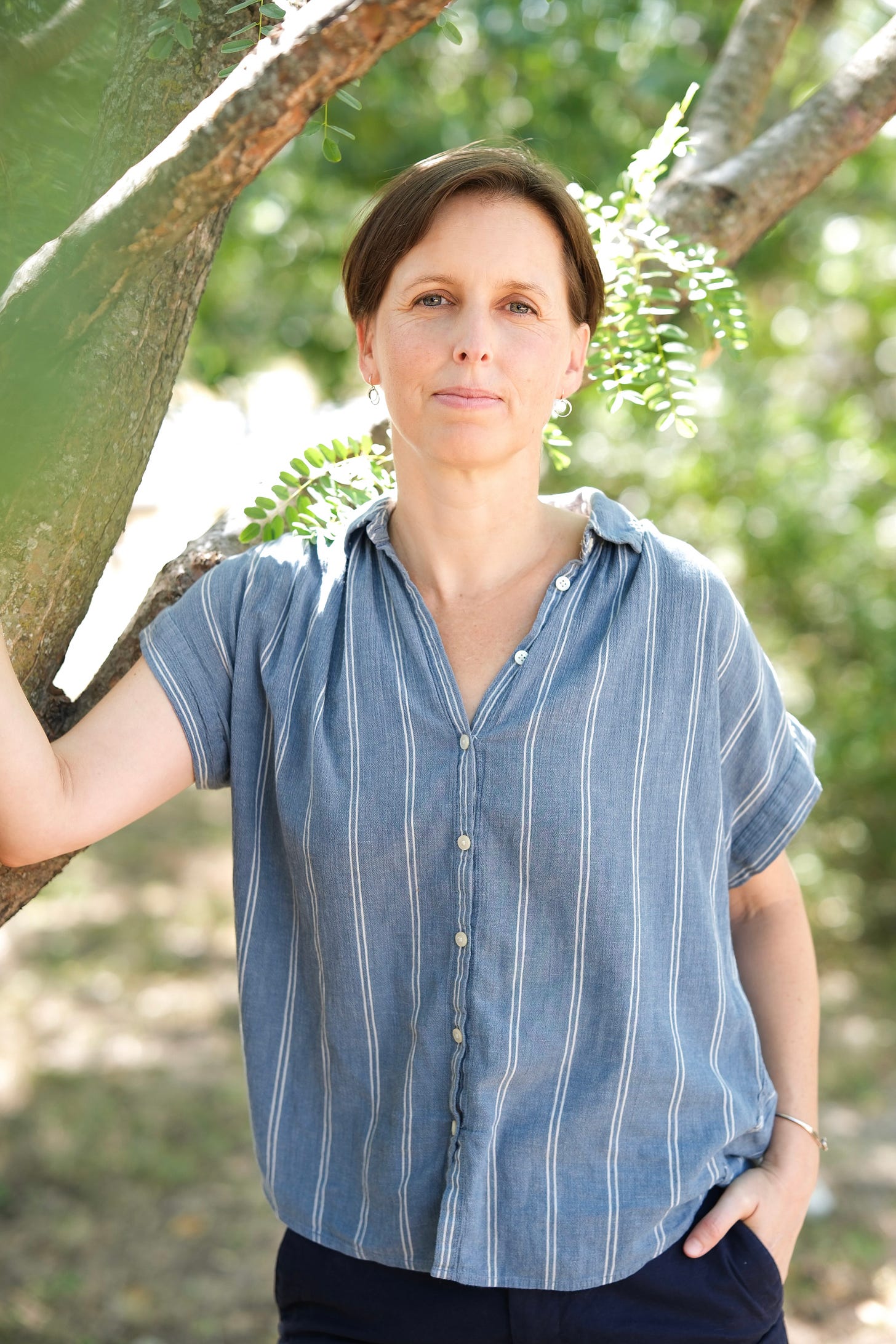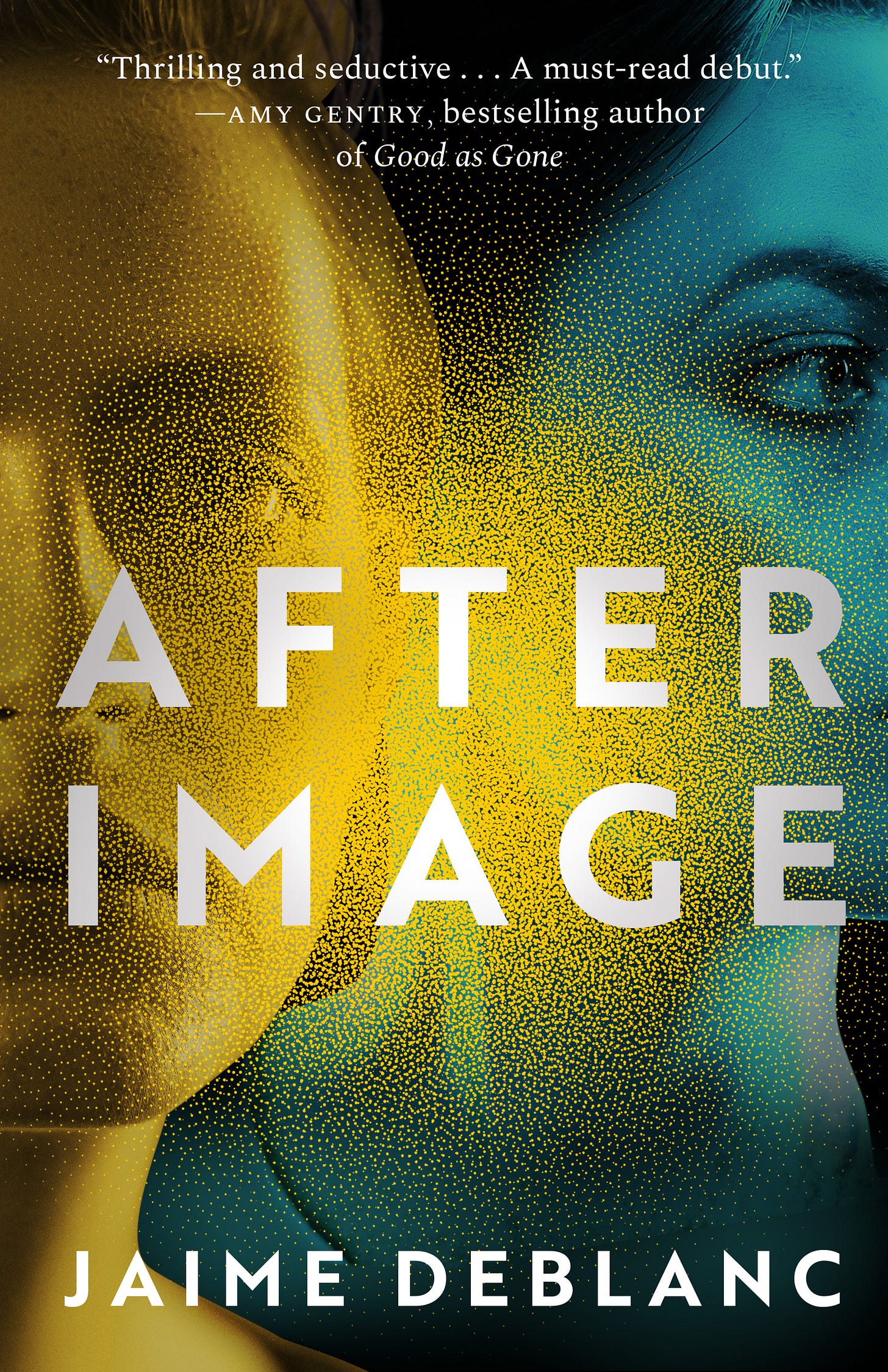A Reader's Interview with Jaime DeBlanc
Favorite mystery authors, true crime blogs, and the pros and cons of craft books
On a semi-regular basis, I talk to authors about my two favorite topics: reading and writing. You can find previous examples here and here. This week, I’m excited to share my conversation with novelist and writing coach, Jaime DeBlanc. Jaime’s debut novel, After Image, published by Thomas & Mercer, is available in bookstores and online now. She lives in East Austin, where she is a coach for fiction and memoir writers.
Here are some of the things that people are saying about After Image on Goodreads:
“immediately captivating”
“well-crafted”
“impossible to put down”
“I still can’t believe this was a debut novel. The plot, the characters, the pacing. Everything was so good!”
I can personally attest that I started reading After Image and got to page 100 before I realized that I had stayed up way past my bedtime.
I asked Jaime about reading mystery novels, true crime blogs, and what she reads while she’s writing.
1. After Image is a suspenseful mystery about a young woman who is looking for answers regarding the strange disappearance of her stepsister four years earlier. The novel has some classic genre elements--a gruff but caring detective, the young femme fatale--but you are definitely telling a story set in today's world with a more nuanced understanding of psychology and family dynamics than perhaps we would typically find in mysteries or crime fiction of the past. When you were coming up with the idea of After Image, were there any classic mystery authors that you found inspiring? Or the opposite--authors that you intentionally did not want to emulate?
I’m a huge fan of Ross MacDonald (whom Sue Grafton would later emulate) and Raymond Chandler. The plot, the pacing, the dialogue, the humor—all so good! And there’s something about that crisp, hard-bitten prose that really appeals to me.
Sometimes while writing After Image, I would get anxious that the prose was too plain and workmanlike—it certainly didn’t read like the lush, literary language of some of my friends’ writing. But then I would remember MacDonald and Chandler, and they would ground me back into what I was trying to do with After Image. I wanted the sentences to be, as James Baldwin famously said, “clean as a bone,” but also to have these flashes of lyricism that would stand out because they were more rare.
I also wanted After Image to read like a page-turner, so the focus in my writing was much more on plot and pacing. Reading genre fiction like MacDonald’s and Chandler helped remind me that plot and dialogue can be just as beautifully constructed parts of the novel as the lyrical sentence.
2. As I write this, Los Angeles is engulfed in flames, and it's making me think about how many books and stories are set in that fragile landscape. I thought you did a beautiful job of portraying southern California in After Image, from the mountains and canyons to the wealthy neighborhood where Allie's sister Natasha lived with her famous actress mother. Are there any books or writers that you particularly admire for how they portray California, L.A., or Hollywood?
Oh, thanks for saying that! I felt a little nervous while writing some of my L.A. scenes because when writing After Image, I had been away from L.A. for over ten years.
When it comes to depicting L.A., I really love Janet Fitch’s White Oleander, which does a tremendous job of bringing to life the various neighborhoods in and surrounding L.A. I also love Elmore Leonard’s Get Shorty for its hilarious take on Hollywood celebrity culture.
3. For me, one fascinating aspect of After Image is how the novel depicts the world of true crime writing. Natasha was a minor celebrity when she disappeared, and her disappearance became an obsession of true-crime bloggers and online conspiracy theorists. Did you do a deep dive into those black waters? How was that?
I did indeed do a deep dive into the black waters of true-crime forums! Many hours were lost to scrolling through morbid online conversations.
On one level, those forums have a real allure, because they give the impression that these crimes could really be solved by everyday people (and indeed, some true-crime podcasters and journalists have helped crack big cases). But there’s also something discomforting about them, because in many ways these tragedies are treated like entertainment or sport
On these forums, people often throw out unhinged theories and damning judgments. While reading, I would think about how the real people involved in these cases might react to reading the comments. That experience definitely inspired some elements of my book—like my main character, Natasha, lurking in the online forums where the people and events from her life are dissected.
4. Turning to your work as a writing teacher and coach, I'm curious if you read a lot of craft books. If so, do you have any favorites? Has a book on the craft of writing ever significantly changed how you write or teach?
I have a complicated relationship with craft books. There are real gems to be found in them, but I also find that they can get me hung up on the idea that there’s a one-size-fits-all process that just works for writing a book. And I think that’s a bit of a myth. Each of us has to find the unique process that works for us.
That said, I really did love Matt Bell’s book on revision, Refuse to Be Done (although I take issue with the title—“refusing to be done” is something that perfectionistic, anxious writers struggle with enough already!). Bell has a lot of great insights into how work with the raw material of a first draft and hone it into something more focused and polished.
I also love books that focus more on the process of accessing creativity. In my experience, most writers are excellent at being analytical and self-critical but less comfortable trusting intuition and feeling emboldened to take creative risks (or that’s been my particular journey, anyway). The Journey From the Center to the Page by Jeff Davis was a particularly interesting read for me because it focused on how to use yoga and body awareness to access creative flow.
5. Do you read novels while you are working on a novel, or do you find that it's necessary to avoid them? If you feel like sharing, I'd love to know what you're reading while you're working on your next book.
I’m not the greatest reader when I’m working on a book—I still love to read, but I find that I have less brain space to concentrate on literary fiction. So, while writing a manuscript, I tend to read genre fiction and YA, which generally require a lighter mental lift. I also really enjoy delving into research that will inform my work-in-progress.
While working on my new manuscript, I’ve been reading lots of stuff that keeps me feeling inspired and interested in the themes I’m developing in the book: this has included a bunch of Madeleine L’Engle books, as well as article and books on consciousness, quantum physics, and out-of-body experiences.
6. What was the best advice you got about being a new author? (Or worst, if you feel like sharing!)
I think one of the best pieces of advice I got was—to the best of my ability—to ignore the pressures and expectations of the publishing industry.
Once you get a book contract, the details of the business side of things can start to feel overwhelming. How can you best publicize your book, be a social media maven, and boost your book sales, all while working on your next manuscript, which needs to be turned in within the year?
While it’s impossible to totally ignore these aspects of the process, I’ve found that focusing too much on them really disrupts my creative process. For me, writing a draft requires going inward and creating without being overly concerned about audience. So a big challenge of this past year has been figuring out how to navigate the business side of the industry without losing connection with the privacy and intimacy of my writing practice. A lot of that has involved setting boundaries around how much I can be concerned with external approval. I’ve extended the deadline for my new book several times; I’ve stopped fretting so much about publicity; and I’m trying like heck to write my new book first and foremost to please me, rather than other people.
7. Any reading goals for 2025?
I’d love to get back to my ridiculously long TBR list, which I’ve been ignoring for the past year, and to read more outside of my own genre of mystery/suspense.
And I plan on reading All Fours soon, since I’m apparently the only person left on the planet who hasn’t read it!

If you enjoy this newsletter, please consider subscribing or share with your bookish friends.
Check out my latest essay in The Manifest Station, “How I Learned to Stop Worrying and Love Time.”
To learn more about me and my work, visit my website.


